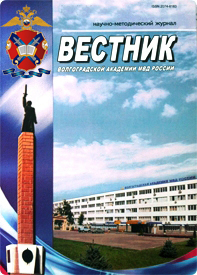In this article the author considers actual problems of the personal enhancement in the e-learning environment. Substantial insufficiency of rendering the concept of e-learning in the normative legal documents, learned treatises is discovered. In the context of the person-centered education an attempt was made to articulate the concept of e-learning with a personal developing potential as a didactic system including personal developing purposes, content and pedagogical educational technologies, the implementation whereof is achieved by telecommunication technologies for providing learning interaction and specific hardware-software means of processing, reception, release, presentation, keeping of various kinds of teaching information. The author suggests that the information educational environment should be considered as the personal-developing environment of e-learning if in the course of e-learning it provides pedagogical conditions for the development of personal activities of students (reflection, self-control, creation, dialogue) and includes resources and instruments of educational information activities and subject-subject interaction of the participants of the learning process.
e-learning, personal enhancement, personal activities, personality-centered education, e-learning environment
1. Serikov V. V. Obschaya pedagogika: izbr. lekcii. Volgograd: Peremena, 2004. 278 s.
2. Serikov V. V. Lichnostno orientirovannoe obrazovanie - poisk novoy paradigmy: monogr. M., 1998. 180 c.
3. UNESCO and the Use of the Internet in its Domains of Competence. URL: http://www.unesco.org (data obrascheniya: 02.03.2017)
4. Ob obrazovanii v Rossiyskoy Federacii: feder. zakon ot 29 dekabrya 2012 g. № 273-FZ // Ros. gaz. 2012. № 5976 (303).
5. Studenikina L. I. Pedagogicheskie usloviya effektivnosti ispol'zovaniya elementov elektronnogo obucheniya v vuzovskoy professional'noy podgotovke studentov: avtoref. dis. … kand. ped. nauk. Kursk, 2007.
6. Ahayan A. A. Teoriya i praktika stanovleniya distancionnogo pedagogicheskogo obrazovaniya: dis. … d-ra ped. nauk. SPb, 2001.
7. Pedagogicheskie tehnologii distancionnogo obucheniya / pod red. E. S. Polat. M.: Akademiya, 2006. 400 s.
8. Novye pedagogicheskie i informacionnye tehnologii v sisteme obrazovaniya: ucheb. posobie / E. S. Polat [i dr.]. M.: Akademiya, 1999.
9. Hutorskoy A. V. Distancionnoe obuchenie i ego tehnologii. URL: http://www.eidos.ru (data obrascheniya: 12.03.2017)
10. Hodyakova N. V. Situacionno-sredovoy podhod k proektirovaniyu lichnostno razvivayuschego obrazovaniya: metodologicheskie predposylki i koncepciya: monogr. Volgograd: Peremena, 2012. 170 s.
11. Serikov V. V. Obrazovanie i lichnost'. Teoriya i praktika proektirovaniya pedagogicheskih sistem. M.: Logos, 1999. 272 s.
12. Asmolov A. G. Psihologiya lichnosti: Principy obschepsihologicheskogo analiza. M.: Smysl, 2001. 416 s.
13. Yasvin V. A. Obrazovatel'naya sreda: ot modelirovaniya k proektirovaniyu. M.: Smysl, 2001. 365 s.
14. Baeva I. A. Psihologicheskaya bezopasnost' v obrazovanii. SPb.: Soyuz, 2002. 271 s.
15. Slobodchikov V. I. O ponyatii obrazovatel'noy sredy v koncepcii razvivayuschego obrazovaniya. M., 2000. 230 s.
16. Slobodchikov V. I. O sootnoshenii kategoriy «sub'ekt» i lichnost' v kontekste psihologicheskoy antropologii // Razvitie lichnosti. 2005. № 2. S. 49-58.
17. Hodyakova N. V. Situacionno-sredovoy podhod k proektirovaniyu lichnostno razvivayuschih obrazovatel'nyh sistem: dis. … d-ra ped. nauk. Volgograd, 2013.
18. Gura V. V. Teoreticheskie osnovy pedagogicheskogo proektirovaniya lichnostno orientirovannyh elektronnyh obrazovatel'nyh resursov i sred: dis. … d-ra ped. nauk. Rostov-na-Donu, 2007.
19. Raickaya L. K. Didakticheskaya koncepciya samostoyatel'noy uchebno-poznavatel'noy deyatel'nosti studentov v internet-srede: dis. … d-ra ped. nauk. M., 2013. 531 s.









